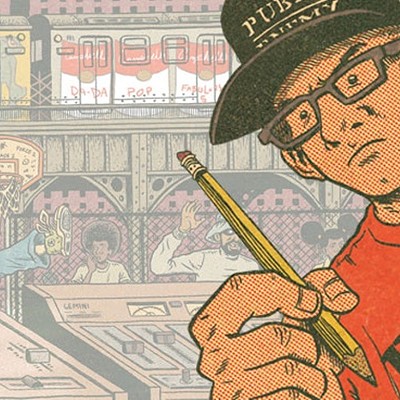Consider the slacker, or at least his caricature: shielded from the world by a carapace as ill-fitting as the smirk on a 7-year-old's face ... scavenging whatever dross the cultural tides wash over him.
Then consider, by contrast, David Foster Wallace, footnote-dropping essayist and author of the novel Infinite Jest. A guy who wants to take you out of your shell, even if it means dropping you in boiling water.
Wallace's latest book, Consider the Lobster, stirs the pot with 10 lively nonfiction essays and literary critiques. His topics are as far-flung as in his previous nonfiction collection, 1997's A Supposedly Fun Thing I'll Never Do Again. The only constant is Wallace's voice, which retains an everyman quality -- he grew up and lives in the Midwest -- even while proving that the author is something of a mess, psychologically speaking. (In one suitably Seinfeldesque aside, Wallace confesses to losing friendships over his inability to end conversations gracefully.)
The book's lead-off essay, an account of the porn industry's Oscar awards, demonstrates that voice perfectly. Wallace somehow brings you inside strange worlds while remaining a wry outsider himself. At a porn-star cocktail party, he confesses an "unconscious expectation/dread/hope" that everyone will be sent "tumbling into a tangled mass of limbs and orifices." (This fantasy is, he concedes, as likely as a medical convention "tumbl[ing] into a frenzy of MRIs and epidurals.")
Overall, however, this collection isn't as much fun as Fun was. It's really not trying to be.
Take the title essay, about a Maine lobster festival. It begins much like Fun's amusement-park-ride account of the Indiana State Fair. But unexpectedly, "Lobster" begins to investigate the ethical questions bound up in eating lobster -- and how we dodge those questions. Clearly, he's upping the ante, even if his exploration is somewhat halting. (It was written for Gourmet magazine, after all.) See also the account of John McCain's 2000 presidential campaign, where Wallace sees "a very modern and American type of ambivalence": a conflict "between your deep need to believe and your deep belief that the need to believe is bullshit."
Such concerns may seem dated: If anything, since 9/11 we've seen how dangerous belief can be when it's not alloyed by cynicism. Yet as Wallace makes clear in "Host," a sprawling survey of the radio talk-show landscape, the war on irony is still worth fighting. "Host" comes a decade late, perhaps: Do we really need Wallace to tell us that talk radio is intended "not to be responsible, or nuanced" but merely "stimulating"? But as Wallace sagely notes, that the profusion of "ideologically based news outlets creates precisely the kind of relativism that cultural conservatives decry, a ... free-for-all in which 'the truth' is wholly a matter of perspective and agenda."
Some of the most trenchant essays here are also the shortest. Take his screed against John Updike, whom Wallace faults for massive self-regard and voluminous misogyny. One senses a generational, even Oedipal, rivalry in Wallace's critique of Updike and his fellow "phallocrats." Updike both writes for and belongs to a generation for whom "the ultimate horror" was "hypocritical conformity and repression," Wallace surmises. But "the children of all the impassioned infidelities and divorces Updike wrote about so beautifully," he adds, have ample reason to resent that generation's self-indulgence
The knock against Wallace's own writing -- that it's too enamored of po-mo parlor tricks and way way too unfocused -- has generational overtones as well. And unfortunately, you can find evidence to support that critique in Lobster too.
There are, for starters, those notorious footnotes. Sometimes they're fun and even useful: The asides in his essay about language, for example, were all that got me through it. But elsewhere they're just plain irritating. Even Wallace's footnotes have footnotes, and occasionally they literally crowd the main narrative off the page.
Wallace presumably intends these annotations to reflect our modern multi-tasked consciousness. The footnotes act like the news ticker running below the CNN anchor's head -- demanding our attention until we lose track of the story we were trying to follow. I'd call that clever ... except that escaping the multi-tasked consciousness is exactly why some of us like reading in the first place.
Against these excesses, however, must be weighed Wallace's real accomplishment. And that is simply to sound -- no, to be -- sincere. How many campus literary icons, for example, would acknowledge being regular churchgoers? How many would intersperse a review of a book on Dostoevsky with asterisked questions like: "Deep down, do I even really want to be a good person, or do I only want to seem like a good person so that people (including myself) will approve of me?"
The Dostoevksy review delivers a self-referential punchline, of course: If writers today want to tackle the questions Dostoevsky did, Wallace contends, they must resort to tactics such as "sticking the really urgent stuff inside asterisks as part of some multivalent defamiliarization-flourish or some such shit." But this isn't just a po-mo stunt. What Wallace admires most about Dostoevksy is that "He never stopped promulgating the unfashionable stuff in which he believed." Wallace himself clearly hopes to find the same courage, but he isn't quite comfortable following Dostoevksy's example. (There are, it seems, a lot of things he isn't quite comfortable with.) Perhaps that's why he uses 21st-century post-ironic devices so heavily: to help him pose questions once asked by 19th-century novels.
So while the po-mo tricks may be irksome, they allow Wallace to both hide and reveal himself all at once. And that's a much more flexible armor you'll find on the average lobster ... or the stereotypical Gen X-er.














